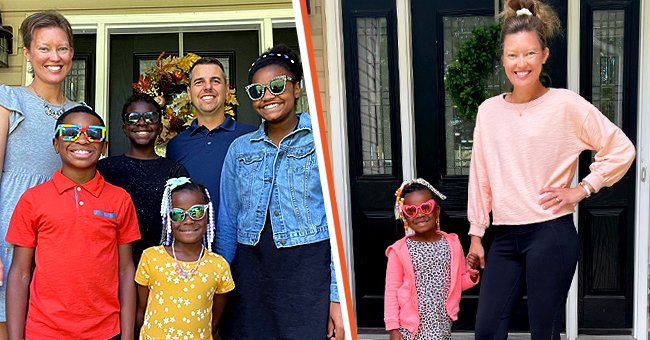
Mom with Adopted Black Daughter Asked for Papers to Prove the Kid 'Belongs to Her' at a Hospital
When a white mother and her adopted black daughter tried to register at the hospital before a scheduled surgery, a nurse requested papers that would prove the child was hers. The mother was upset and decided to say something about it.
Rachel Garlinghouse took her eldest daughter to a scheduled surgery appointment and wanted to focus her energy on soothing her child, but she couldn't. The woman handling their registration asked her an array of unexpected questions.
By sharing her experience online last year, the mother hoped to raise awareness so other families would not face the same treatment. Garlinghouse attempted to register her child for a tonsillectomy when the employee made an odd request.
![Parents and their adopted children [left] A little girl and her adoptive mother [right] | Photo: instagram.com/whitesugarbrownsugar](https://cdn.amomama.com/4735fec79be48bdb602a6c629e4b23b5.jpg)
Parents and their adopted children [left] A little girl and her adoptive mother [right] | Photo: instagram.com/whitesugarbrownsugar
ASKING FOR HER DAUGHTER'S "PAPERS"
The employee asked the mother to provide her daughter's "papers" even though they had the same surname and presented all the required medical and insurance information.
The employee made another request for the "papers" because she allegedly needed something that proved the girl belonged to Garlinghouse. The mother was furious and tried to keep a straight face as she replied:
"Well, she’s calling me mommy, we have the same last name, and we have the same insurance. She’s my daughter.”
FALSE ASSUMPTIONS
The employee was still not satisfied. Garlinghouse told her they didn't carry around their children's birth certificates or court papers. The mother also noticed a white family standing a few feet from them.
Per Garlinghouse, the family wasn't subjected to the same questions and interrogation. While she understood the need to identify parents and children in the hospital, she felt their encounter was based on false assumptions.
"IT CAN BE EMBARRASSING"
Garlinghouse expressed how the encounter made her feel. She said: "When an adult who is supposed to be professional grills us about our authenticity in front of our kids, it's othering, it can be embarrassing, and it's solely based on race."
She suggested better ways of checking the identity of parent and child. Garlinghouse shared that it was more appropriate to be tactful and ask the child who was accompanying them at their appointment.
EDUCATING PEOPLE ON THE MATTER
This approach would engage the child and provide the needed answers. Employees could also ask the adult about the nature of their relationship with the child. Both of these options were unoffensive.
Garlinghouse hoped her story would educate others on interacting with families who look different from theirs. She hoped her experience would save others from similar interrogations and unnecessary questions.
ANOTHER WOMAN QUESTIONED UNNECESSARILY
Garlinghouse wasn't the only person who experienced an uncomfortable encounter based on race. Lakeyjanay Bailey, a black 21-year-old woman, and her 4-year-old adoptive sister, Olivia, flew from Denver to Dallas last year when they were questioned.
Police stopped Bailey while her white sister was asked if she knew her. A passenger on their plane had been concerned about human trafficking and had alerted authorities. The concern was unwarranted and caused unnecessary hassles for the family.
Both Bailey and Garlinghouse were upset because of the unfair questioning they had to endure solely based on appearances. They shared their stories to raise awareness and make people think twice before interrogating multiracial families.
